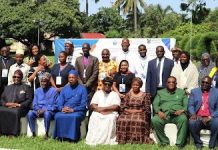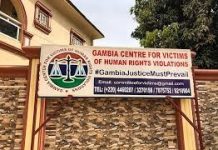By Nelson Manneh
A new monitoring report by The Gambia’s National Human Rights Commission (NHRC) has revealed that the government has implemented only 20 percent of the recommendations made by the Truth, Reconciliation and Reparations Commission (TRRC), highlighting a slow pace in the country’s transitional justice process.
The report warns that the continued delay risks eroding public trust, particularly among victims and survivors of human rights violations who have been waiting for justice and reparations.
The Government’s White Paper, which outlines its position on the TRRC’s findings and recommendations, was issued in May 2022 following the submission of the final TRRC report to the President on November 25, 2021. Out of 265 recommendations, the government accepted 263, either fully or partially, and rejected only two. The White Paper addresses 17 thematic areas, including reparations, reconciliation, memorialisation, institutional reform, and amnesty.
According to the NHRC report, 143 activities, representing 47 percent of the recommendations, are currently ongoing, while 101 activities, equivalent to 33 percent, have yet to be implemented. The Commission said monitoring of the White Paper Implementation Plan revealed uneven progress despite the government’s commitment during the reporting period. It added that implementing institutions require adequate financial and technical resources to meet their timelines.
The report, however, noted some progress during the year under review. Key milestones achieved include the enactment of the Special Accountability (TRRC) Mechanism Act 2024, the Special Prosecutor’s Office Act 2024, and the operationalisation of the Reparations Commission—significant steps toward justice, accountability, and reparations for victims.
Other initiatives cited include capacity-building and awareness-raising programs, the establishment of the Special Criminal Division of the High Court, support for the Office of the Special Prosecutor, and the provision of medical and psychosocial support to victims.
“In addition to its monitoring role, the NHRC also conducted training for security agencies on International Humanitarian Law (IHL), International Human Rights Law (IHRL), and Sexual and Gender-Based Violence (SGBV) Modules developed in 2023,” the report stated. “The Commission is working with the Office of National Security to integrate these modules into the curricula of the various training schools within the security sector.”
To enhance coordination and oversight, the NHRC in 2022 established the *Multi-Stakeholder Support Monitoring Committee*, which brings together representatives from government and non-governmental institutions. The Committee meets quarterly to review progress, identify challenges, and provide strategic guidance to improve implementation.
“The Committee plays a crucial role in ensuring timely and effective monitoring of the TRRC recommendations, identifying obstacles in the implementation process, and offering solutions to address them,” the report added.
The Commission said the findings of the third monitoring report were informed by quarterly committee meetings, stakeholder updates, victim-led organizations, civil society inputs, and media reports. The draft report was validated through a wide stakeholder consultation held on July 17, 2025, before being finalized and submitted to the National Assembly.




















